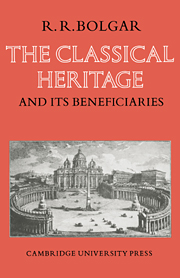Book contents
- Frontmatter
- Contents
- Preface to 1973 impression
- Introduction
- Chapter I The Background
- Chapter II The Greek East
- Chapter III The Carolingian Age
- Chapter IV The Pre-scholastic Age
- Chapter V The Scholastic Age
- Chapter VI Collapse and New Beginnings
- Chapter VII The High Renaissance
- Chapter VIII The End of the Renaissance and the Appearance of New Patterns in Classical Education and Scholarship
- Chapter IX Education and the Classical Heritage
- Notes
- Appendix I Greek MSS. in Italy during the Fifteenth Century
- Appendix II The Translations of Greek and Roman Classics before 1600
- Index
Chapter IX - Education and the Classical Heritage
Published online by Cambridge University Press: 29 January 2010
- Frontmatter
- Contents
- Preface to 1973 impression
- Introduction
- Chapter I The Background
- Chapter II The Greek East
- Chapter III The Carolingian Age
- Chapter IV The Pre-scholastic Age
- Chapter V The Scholastic Age
- Chapter VI Collapse and New Beginnings
- Chapter VII The High Renaissance
- Chapter VIII The End of the Renaissance and the Appearance of New Patterns in Classical Education and Scholarship
- Chapter IX Education and the Classical Heritage
- Notes
- Appendix I Greek MSS. in Italy during the Fifteenth Century
- Appendix II The Translations of Greek and Roman Classics before 1600
- Index
Summary
We have seen how the educational possibilities of the classical heritage came to light one by one in a succession determined by the challenge of events, and how they developed in a manner directly dependent upon social needs.
For some time after the break-up of the old order, the memorials of the Graeco-Roman past lay scattered in a thousand manuscripts, inscriptions, monuments and works of art which could not be interpreted without expert study. Roman civilisation survived in every town, in every village almost, but it was as useless to their inhabitants as an outcrop of coal to a shivering savage. Western man had little understanding of the extent or value of his intellectual inheritance.
The first discoveries of what Latin literature had to offer were made in the eighth century, by which time the virtual disappearance of the imperial schools had led to such a decline in education that the clergy were no longer competent to read their Bibles. Further retreat down the road of ignorance would have endangered the entire fabric of the Church's authority; and at that point, under the pressure of dire need, some of the ancient grammar curriculum was brought back into use. It is true that the Christian writers of the patristic age held first place as text-books and as models for literary imitation. But the pagans were not forgotten. Donatus and Priscian were read for the rules of syntax and prosody. Virgil was popular. Suetonius inspired one famous work —Einhard's Life of Charlemagne; and even mathematics, history and natural science came in for a certain measure of attention.
- Type
- Chapter
- Information
- The Classical Heritage and its Beneficiaries , pp. 380 - 393Publisher: Cambridge University PressPrint publication year: 1973



